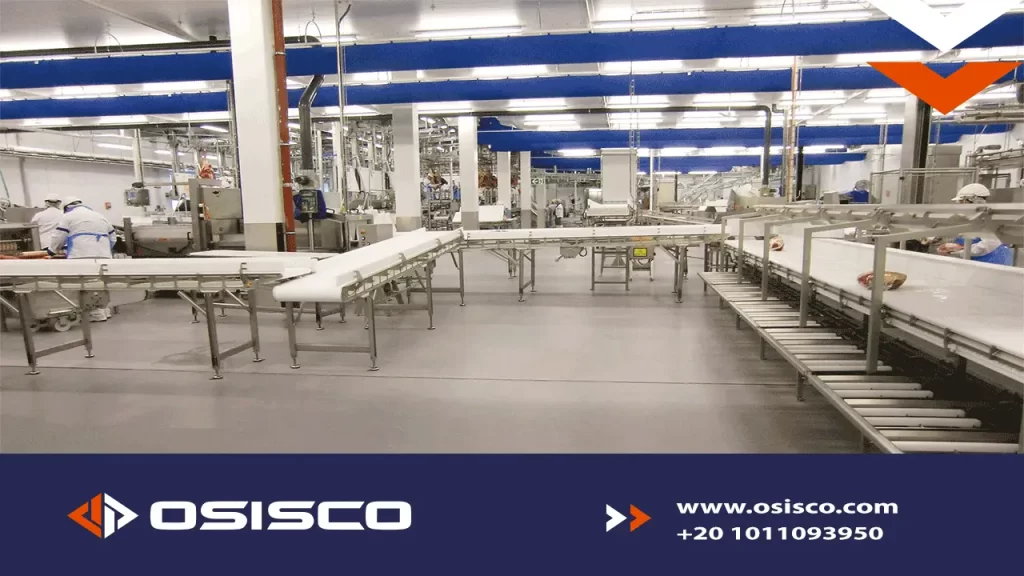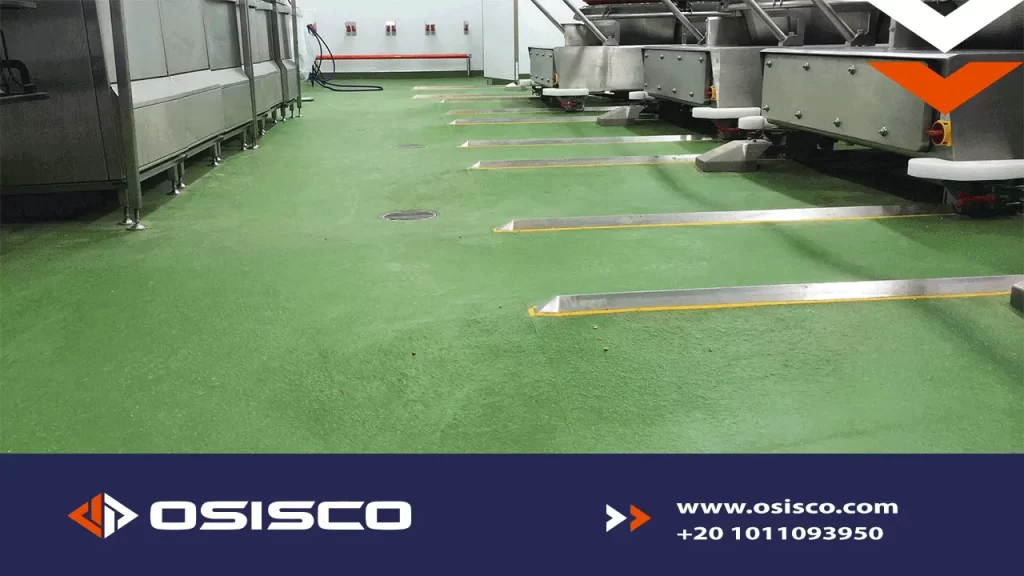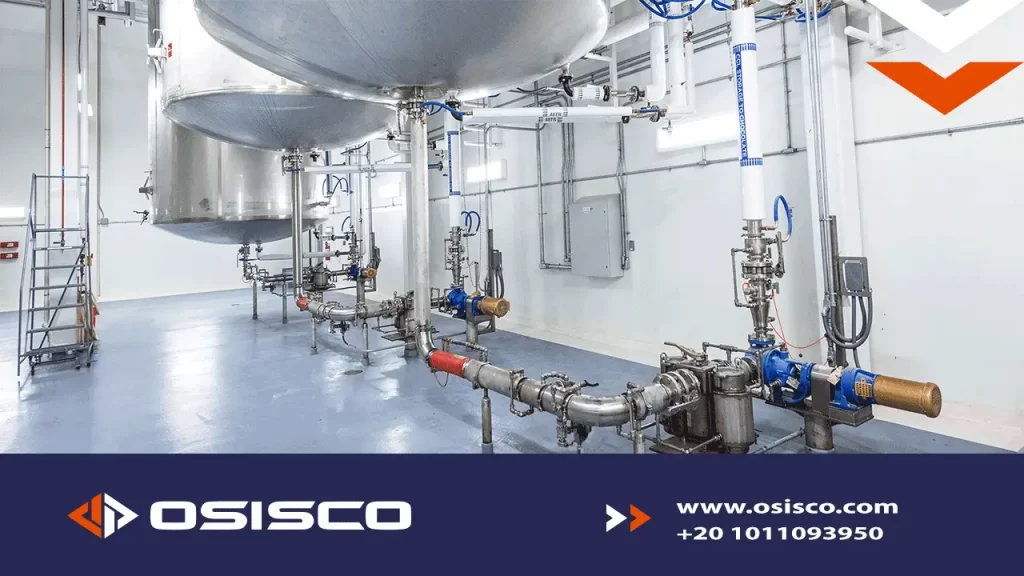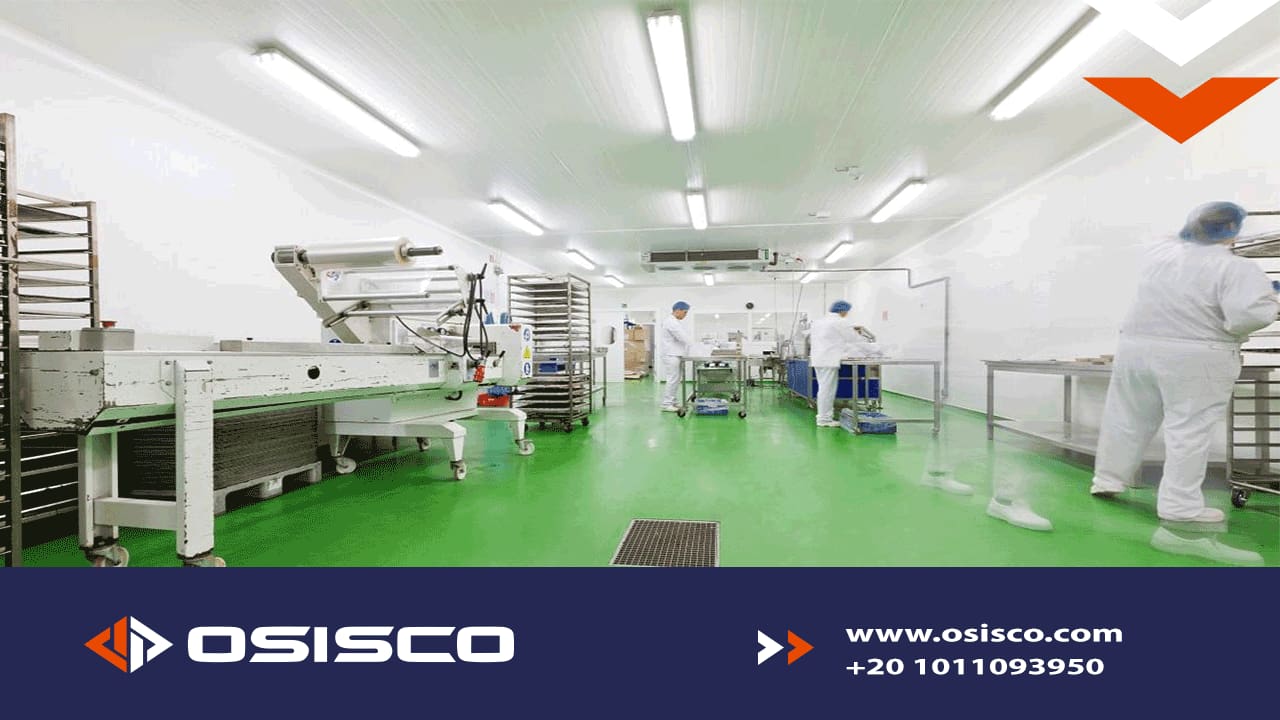Flooring systems in the food industry are very important. Consumer confidence in food quality is essential, and the safe production of food and beverages depends greatly on the hygienic design of food processing facilities.
Because of the sensitive nature and potential for contamination of these environments, food safety requirements are taken into consideration when designing and constructing food or beverage processing facilities.
This article provides general criteria for selecting a protective flooring system and the best resin flooring solution, next we will know more about it with OSISCO.
Why do I need a protective flooring system?
Food processing plants and food factory floors are exposed to a variety of food by-products, such as hot fats and oils, blood solutions, sugar, and natural food acids.
Due to their corrosive nature, many of these substances can cause significant, cumulative damage to unglazed concrete floors.
These substances penetrate the concrete material, which leads to the growth of microbes and the spread of bacteria. Over time, this can degrade the food production environment and contaminate the food.

In addition, flooring systems in the food industry can take a lot of stress due to abrasive cleaning and care processes. These cleaning techniques include steam cleaning, high-pressure cleaning, hot water rinsing, and the use of effective cleaning solutions.
Read more about What is the best usage of Epoxy Terrazzo?
These cleaning methods can seriously damage the exposed concrete surface. Aggressive washing starts surface erosion, revealing weak points in the concrete, while steam washing and hot water rinsing can heat up severely stressed concrete slabs.
As it wears down with use, it becomes more porous and vulnerable to bacterial attack.
In areas where consumer food and beverages are manufactured, processed, packaged, or stored, exposed concrete slabs must be covered with high-performance Flooring in Food Industry solutions for all of the above reasons.
Today, these food and beverage manufacturing environments increasingly require seamless resin floors because of the material’s hygienic appearance and durable performance characteristics.
Consider these factors when selecting a resin-protective flooring system for your food manufacturing facility.
Understanding the critical operating parameters and service requirements for your food manufacturing facility or region is the first step in selecting a resin bed system that best meets relevant food safety standards.
Flooring Hygiene
Due to seamless surfaces, superior durability, and high-quality material performance, resin floor systems improve plumbing performance.
Additional developments from OSISCO have enhanced the ability of precast floors to maintain hygienic floors. Polyurethane floor systems contain Polygiene®, an antimicrobial ingredient that is evenly distributed throughout the resin matrix of polyurethane floor systems to improve site hygiene standards and keep surfaces completely free of harmful bacteria, mold, and yeast.
Read more about Self-leveling epoxy what are its best benefits?
Protection against gram-positive and gram-negative bacteria such as Salmonella typhi, MRSA, and E. coli bacteria may grow more slowly when exposed to Polygiene®.
International tests have shown a 99.9% reduction in bacterial counts on polyurethane floors treated with Polygiene.
This antimicrobial protection provides long-term hygienic performance as the flooring systems in the food industry last a lifetime from wear and tear, unlike many antimicrobial alternatives.
Slip-resistant

It is important that all flooring systems in food preparation and preparation areas, break rooms, and facilities have non-slip surfaces to prevent tripping and slipping that can lead to work-related injuries.
It is even more important to test flooring systems in wet service scenarios to ensure that the flooring provides an appropriate level of worker safety.
Furthermore, for wet service areas, the floor structure should be placed over a lintel. And there is a need. This gives you an effective drainage system that prevents water buildup and reduces the risk of slipping.
Resin floors are available in a variety of textures and may also be dust grained to improve the anti-slip profile of flooring systems.
If high slip resistance and ease of cleaning are equally important, but a rough surface is difficult to maintain (for example, a positive-rated resin floor system), compromises may be necessary.
You can know more with OSISCO Epoxy Systems Service.
Chemical-resistant
Food and beverage manufacturing facilities often contain a mixture of organic and inorganic acids, alkalis, salts, hot oils, blood, sugars, and fats, making these manufacturing environments chemically vulnerable to attack.
If the nature or severity of the chemical attack is not expected to persist, surface erosion, softening, or delamination may occur.
Its chemical resistance profile is influenced by the resin flooring system’s thickness, resin base, and chemical reactions.
Polyurethane flooring systems, commonly called polyurethane screeds, are the most effective and comprehensive protection against chemical attacks.
Significantly increases the resistance of polyurethane floors to corrosive substances, solvents, food by-products, organic acids, etc.
Epoxy flooring systems and methyl methacrylate floor systems differ in their resistance to some chemical contaminants.
Thermal Shock and Cycling

Food and beverage manufacturing plants and some agricultural operations may experience thermal shock conditions as part of their daily operations. If you get the floor material wrong, it can damage your floor.
Read more about Epoxy flooring | What are the best advantages of it?
Thermal shock occurs when floors in food processing facilities, usually kept at room temperature, are scrubbed with very hot water or steam to remove blood, oil, and other stubborn chemical contaminants. Due to sudden temperature changes, floors expand and contract differently than the subfloor.
Eventually, if the flooring systems in the food industry facilities are not sufficiently resistant to thermal shock, the flooring structure may begin to collapse, crack, blister, crack, or disintegrate.
Cold stores, blast coolers, and rooms containing furnaces and kilns, in particular, require suitable flooring solutions that can withstand prolonged exposure to temperatures outside the normal range.
The thick cementitious polyurethane floor solution can meet the requirements of these operating conditions.
This is because, compared to epoxy or methyl methacrylate systems, cement-bonded polyurethane systems can withstand higher thermal loads and temperature changes.
Because the thermal expansion of polyurethane systems is comparable to that of concrete, the structure of the material can withstand long-term and can expand, compress and move with the substrate without suffering physical damage.
Maintenance and cleanliness
Due to the abundance of various chemicals and harsh working conditions, floors in the food industry are notorious for experiencing higher loads than other surfaces.
To maintain the overall appearance, cleanliness, and function of your resin floors, you need to set up an effective cleaning and maintenance schedule.
Read more about Metallic Epoxy What are its top benefits?
Most specialty cleaners are generally harmless to resin beds when used according to the chemical cleaner manufacturer’s instructions. In addition, contact the manufacturer of the resin beds for detailed cleaning recommendations.
We recommend doing a small spot test on an inconspicuous area before using any new cleaner. The cleaning plan should include an overview of the equipment that will be used.
While the use of hot water rinsing and steam cleaning with cementitious polyurethane systems is compatible, these cleaning techniques are not recommended for use with epoxy or MMA systems.
What are your options for Flooring Systems in the Food Industry and beverage factories?
This is a frequently asked question by industrial facility managers and plant operators working in the food and beverage industry.
All of the different work areas within food and beverage manufacturing facilities are subject to different operating conditions. This is why OSISCO resin bed systems are available in a wide range of colors and widths.
Concrete Polyurethane
Customers in the food industry often choose cement-bonded polyurethane flooring, also known as polyurethane (PU) screed.
The common form of polyurethane used in this application is stucco. Grout combines cement and water-based technology with high cross-link density and durability, making it superior in harsh environments and subject to long-term chemical attacks.
Read more about Concrete polishing
Moreover, the coefficient of thermal expansion of polyurethane resin systems is comparable to that of concrete.
This prevents the material from cracking when subjected to extreme and sudden temperature changes, providing an excellent advantage when paving directly over concrete in areas subject to thermal shock and heat cycling.
Cement-bonded polyurethane resin flooring systems are non-porous, which prevents bacteria and mold spores from living in the joints and cracks commonly found in other Flooring in Food Industry systems such as tile and acid brick. It is also odorless, safe, and non-toxic.
Metacryl Methacrylate (MMA)
MMA flooring solutions are known for their fast cure times and very low installation temperatures for food manufacturing and processing facilities.
MMA resin is the best choice for urgent new construction projects and large production facilities that want to minimize downtime and disruptions. Completely harden in 1-2 hours.
In addition, MMA resin material is UV resistant and chemically resistant to various acids and alkalis. MMA has a distinct odor, but it is safe and can be minimized through proper ventilation during installation.
Epoxy Flooring
Epoxy floor coatings are typically applied with a trowel or roller and come in a variety of colors. They are 2 or 3-component systems. You can also sprinkle aggregate over the epoxy coating to create a non-slip floor finish.
Epoxy flooring systems resist organic acids (naturally found in foods) and are prone to thermal stress failure, leading to floor cracking and delamination.
Therefore, in demanding food and beverage processing environments, an epoxy flooring system is the best flooring solution.
Raw parts in food facilities that are not subject to the same stringent protection requirements, such as packaging, maintenance, breakout areas, hallways, lobbies, and office spaces, are well suited for epoxy floor coatings.
Flooring systems in the food industry are your gate to protection.
